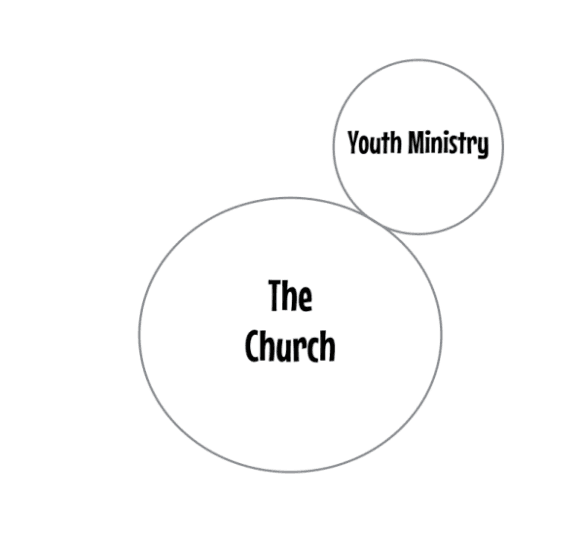As you know, I grew up in church. My parents made sure my brother and I were in church as many Sundays as possible, and that was quite a few. When I was in elementary school, I didn’t really pay attention to big church things and how everything was structured. I was just focused on being where I was supposed to be, whether it was Sunday school, worship, or children’s church. But as I grew up, my awareness of the church as a whole increased. I became more aware of how the kids and youth fit into the church as a whole. It became clearer as I grew up that the youth were, I wouldn’t say dismissed or ignored, but I didn’t feel that we were typically a big priority to most people in the church. I became a Christian in 8th grade and all we had for adults in the youth ministry was the youth pastor, an amazing man named Jeremiah. While Jeremiah did an AMAZING job as the youth pastor, he was only one person.
Back in 2019, my brother and I went to visit Jeremiah and his family in Virginia, and I got to talk to him about ministry at our church. He pointed out that he wanted to get more people involved, but dealt with a lot of pushback at that idea, which was discouraging. It was one reason why he left our church to go to Seminary. Fortunately for the youth, and I would argue for the whole church, our new youth pastor was allowed to get more adults involved, and the youth group became bigger and healthier as a result. Things changed a lot in my home church in the following years, mainly the mid-2010s, when I was in college. By the time I was at Lincoln, studying youth ministry, the youth ministry at my home church was flourishing, and so was the church as a whole. So why am I telling you this?
While I was at Lincoln, in one youth ministry class, we talked about church structure, and how youth groups and kids fit into the church as a whole. One such model, which scares me to death, is called the One-eared Mickey Mouse model. I’ll show it below:

The idea behind this model is that the adult church is its own thing, and the youth are its own thing, but they’re slightly connected. This is not healthy. It’s not what God wants. I’ve lived in this model before, and it’s not fun for the youth or the kids. Sure, you may have kids that find Jesus in this model, because that’s what the youth ministry is, in part, aiming to accomplish, but what happens when those youth become adults? Where do they belong?
When you read the Bible, it doesn’t mention kids very often in terms of the church. Kids aren’t a big part of the book of Acts for example. However, the disciples were kids, or at best teenagers. Peter was the only one over 18 years old and some theologians believe John, the author of Revelation, was no more than 8 years old when he followed Jesus. These are the people that led the church in the book of Acts. These are the people that spread the gospel, encouraged the church, and passionately followed God wherever He led them. So while age isn’t explicitly listed in the Bible, people of all ages were part of the church, the one body that Paul talks about in Romans 12 and 1 Corinthians 12.
When talking about the perfect church, most people point to Acts 2. It was where people were sharing everything with each other and enjoying community with everyone. However, as great as that picture is, I’d like to refer you to another really good picture of the church in Revelation 7. Revelation 7:9 says, “After this I looked, and there before me was a great multitude that no one could count, from every nation, tribe, people and language, standing before the throne and before the Lamb. They were wearing white robes and were holding palm branches in their hands.” The chapter goes on to describe this great multitude praising God, even though they have dealt with struggles and trials in their lives. This great throng of people, we are told, are from all walks of life. The church is meant to be for everyone, not just those that fit our preferences. I am very thankful that teens and kids are valued and loved here at RCC. I love seeing adults connect with the kids and teens both here at church and outside of church. It honestly makes my life and my job much easier.
Studies show that when students have 5 or more healthy relationships with adults in the church, they are exponentially more likely to stay in the church after they graduate high school, which is a big deal. That’s one thing I’ve been focused on a lot in the last several years. We live in a culture that is more and more effective at distracting us, not just teens, from what really matters, and that’s following Jesus. So in order to combat that, it’s important that we remain united as a church. That includes people of all ages, from the babies in the nursery to the adults in the pews. We are all one body, and the more we live that out, the better off everyone will be.
Psalm 78:1-8
1 My people, hear my teaching;
listen to the words of my mouth.
2 I will open my mouth with a parable;
I will utter hidden things, things from of old—
3 things we have heard and known,
things our ancestors have told us.
4 We will not hide them from their descendants;
we will tell the next generation
the praiseworthy deeds of the Lord,
his power, and the wonders he has done.
5 He decreed statutes for Jacob
and established the law in Israel,
which he commanded our ancestors
to teach their children,
6 so the next generation would know them,
even the children yet to be born,
and they in turn would tell their children.
7 Then they would put their trust in God
and would not forget his deeds
but would keep his commands.
8 They would not be like their ancestors—
a stubborn and rebellious generation,
whose hearts were not loyal to God,
whose spirits were not faithful to him.
Love You
Marty


